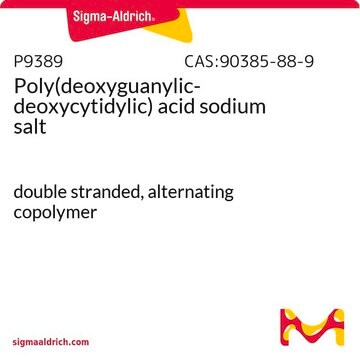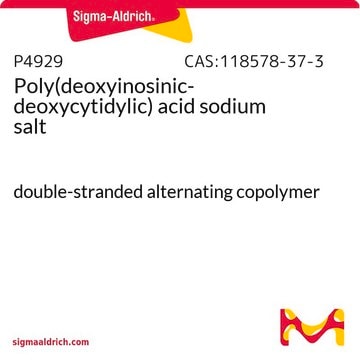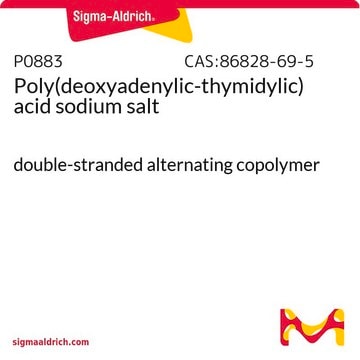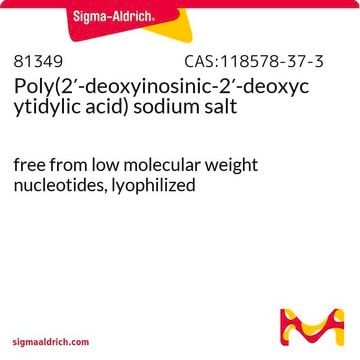75641
Poly(2′-deoxyguanyl-2′-deoxycytidylic acid) sodium salt
ampule of >10 A260
Synonym(s):
Poly(dG-dC) sodium salt
About This Item
Recommended Products
grade
for molecular biology
Quality Level
form
liquid
packaging
ampule of >10 A260
solubility
H2O: complete 1 mL/vial, clear, colorless
storage temp.
−20°C
InChI
1S/C19H26N8O13P2/c20-12-1-2-26(19(30)23-12)13-3-8(28)10(38-13)5-37-42(34,35)40-9-4-14(39-11(9)6-36-41(31,32)33)27-7-22-15-16(27)24-18(21)25-17(15)29/h1-2,7-11,13-14,28H,3-6H2,(H,34,35)(H2,20,23,30)(H2,31,32,33)(H3,21,24,25,29)/t8-,9-,10+,11+,13+,14+/m0/s1
InChI key
IBZPKQZTZXRCKY-WKSZEZMPSA-N
Looking for similar products? Visit Product Comparison Guide
Application
Biochem/physiol Actions
Packaging
Storage Class Code
11 - Combustible Solids
WGK
WGK 3
Flash Point(F)
Not applicable
Flash Point(C)
Not applicable
Personal Protective Equipment
Certificates of Analysis (COA)
Search for Certificates of Analysis (COA) by entering the products Lot/Batch Number. Lot and Batch Numbers can be found on a product’s label following the words ‘Lot’ or ‘Batch’.
Already Own This Product?
Find documentation for the products that you have recently purchased in the Document Library.
Our team of scientists has experience in all areas of research including Life Science, Material Science, Chemical Synthesis, Chromatography, Analytical and many others.
Contact Technical Service







![Poly[d(I-C)] lyophilized, pkg of 10 U (10108812001 [A<sub>260</sub> units]), pkg of 50 U (11219847001 [A<sub>260</sub> units])](/deepweb/assets/sigmaaldrich/product/images/352/091/ef743cea-ccd8-44f1-8f3b-dec5a1e4f5d1/640/ef743cea-ccd8-44f1-8f3b-dec5a1e4f5d1.jpg)
